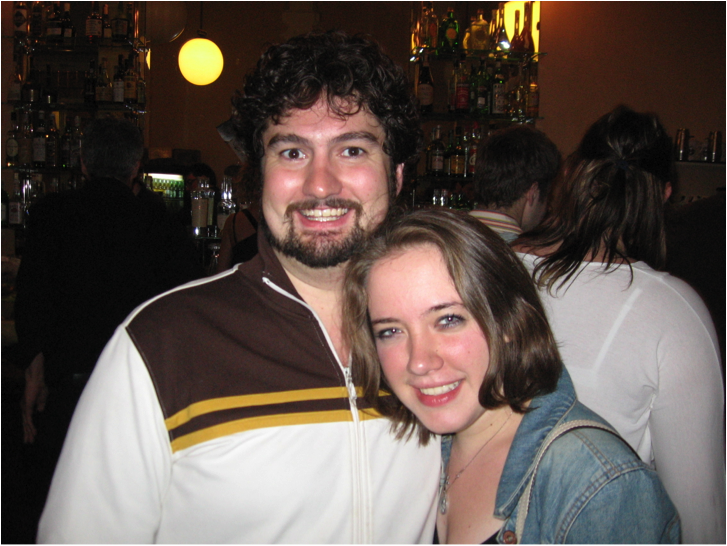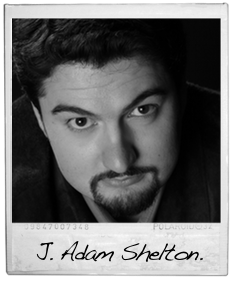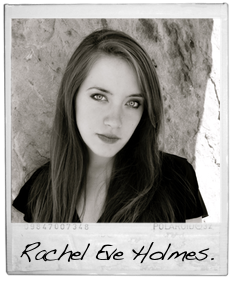Latest Blog
Sep 08, 2016
Sandy the Foundry’s Hospitality Manager is retiring
Apr 07, 2016
If you’ve participated in Rock Workshop, we want to hear from you
Mar 08, 2016
Three tips for performing songwriters
Feb 29, 2016
In Defense of Electronic Music
Feb 15, 2016
Getting Along With Tonight’s Sound Engineer
Blog
Archive
Tags
Sep 19, 2014
Oh The Places You’ll Go: An interview between Rachel Holmes & Adam Shelton
Rachel and I decided to ask each other several questions that we hear frequently to give students a glimpse into our lives and experiences as professional singers. Rachel and I go way back… to 2008. We have been friends ever since we met at a summer program in Italy. How well did we hit it off? We rode on a bus through the hills of Italy for almost six hours with little lull in the conversation and without puking!! (It’s a very hilly countryside..) We have worked together on several occasions since that summer, most recently with Opera for the Young, and look forward to performing together again!
 1. Is there one piece of advice that you can offer any aspiring singer?
1. Is there one piece of advice that you can offer any aspiring singer?
Rachel: I would tell aspiring singers that their voice is special, unique, and that no one can take that away from them. Not everyone will win a Grammy, Tony, or Metropolitan Opera contract, but every singer has a strength and sound that is unlike anyone else. When one keeps this in mind it gives you courage to sing loud and proud, regardless of age, experience, or skill level. There is room in this world for all of us to find a place to sing, so seek that place out, and jump in whole-heartedly! The world will be happy that you did!
Adam: Find your unique perspective musically. Your teacher can, and should, help you figure it out, but ultimately you are the only person who can determine your unique perspective!
2. What’s your favorite music to sing?
Rachel: What a question! It’s nearly impossible to pick! I think it is a tie between three genres: opera, classic music theatre and chamber music. I love opera because it is larger-than-life. It is storytelling at its most grand! I love classic musical theatre because it is the same grand storytelling, but in the vernacular. Musical theatre is a huge component in the history of American music. I love chamber music because I adore collaborating, be it as a member of a choir, or with another instrument or group of instruments to create an aesthetic and sound that transcends one “voice”. I love that this is the ultimate goal!
Adam: Opera is the genre that suits my voice well, but I love singing things that are comical. A good Sondheim number or something by Tom Lehrer are my favorite tunes to end a recital!!
3. When you pick up a new piece of music, what’s your process for learning it?
Rachel: I have always stuck with the way my dear late first voice teacher, James McDonald, taught me. First, however, let’s assume that we are learning an art song or aria in a foreign language. Before you even look at the music, get to know the poem. Take a clean sheet of paper and write the text (German, Italian, French, etc.) out first. Above this text, perhaps in a different color, write the IPA (International Phonetic Alphabet) symbols above each word, so you know how to correctly pronounce every syllable. Below the text, write the word-for-word (not poetic) translation.
Speak the text over and over until it feels absolutely second nature in your body. Study the translation until you know exactly what it means. Then, and only then, should you move on to notes and rhythms. After learning notes and dynamics, etc., consider why the composer may have made the choices he/she made. Were these decisions text driven or seemingly arbitrary, etc.? Consider how the vocal line interacts with the piano or orchestra, etc. This method hasn’t failed me yet. It has really helped me appreciate the sounds and meanings of other languages much more fully.
Adam: I like to read through the text out loud (especially if it’s in another language) to make sure I know every word and pronunciation. Next, translate those foreign texts- if you don’t know the words, you’ll never sing convincingly. Similarly, if the piece is in English, and I don’t know a word, I look up the definition. If the piece is British, find a British recording and listen for the differences in pronunciation and research those words. After all that, I hammer out the notes and rhythms on the piano and divide the opera, or recital, into manageable chunks. Set a goal(s) for memorization and practice. These are highly effective skills no matter your given field. It is far better to go at the task of learning new music with a plan rather than not having one!
4. In your opinion, what is the most exciting part of the 'singer/educator' life? What is the most difficult part?
Rachel: The most exciting part is that no two days in a row are the same! This is no 9-5 job. The hours are strange and the activities from day-to-day are endlessly varied. It is very difficult to be bored in a profession such as this.
On the other hand, this fact can be the most difficult part simultaneously. With loads of travel, I often miss loved ones very much, and because of performing obligations I have missed friends and family member’s weddings, baby showers, etc. It is also often feast or famine financially. One definitely needs to save up money when gigs are plentiful, because there are also “dry” months that you have to get through!
Adam: The best part is getting to do something I love everyday! I have always loved to sing, and I’ve always loved good singing! This way of life allows me to meet new people, teach new and old concepts, hear new music, old favorites, and even share my musical heritage passed on from previous teachers. Sometimes the difficulty is balancing my life as a performer with the studio. We often expect a teacher to be chained to the piano bench cranking out exercises all day. With the current state of the music business across all genres that just isn’t so anymore. There are many pieces to the puzzle, and many ways to make a living as a musician. I don’t want to frustrate students with my absence, however I hope they are as excited for me when these opportunities arise as I am when they are arise for a student!
5. How do you define success as a singer?
Rachel: That is a very personal question that each singer has to decide for themselves. The director of the Ralph Opera Center (where I earned my MM in Vocal Performance), Dr. Todd Queen, put it to me this way once: “decide what is ‘enough’ for you, and then make all of your choices according to it.” If performing in one or two projects per year is your ‘enough’, you will be making different choices than the singer who can’t stand being without work for even a month.
For me it is all about balance. I like enough projects to keep me feeling excited and inspired, but not so many that I feel constantly exhausted, frazzled, and frantic. It is important to check in with yourself frequently to ask, “How am I doing, physically, emotionally, spiritually- not just vocally”?
Adam: This was a pivotal point in my career… defining success. Oftentimes, we think of a successful singer as someone that’s a household name, on the radio, magazine covers, and making millions. However, those successes are rare cases and even “overnight success” is calculated and created by a record label. You are the only person that can determine your success as a singer. True success as a singer, as defined by me, is actually singing. Whether it’s a solo at church, the National Anthem at a baseball game, a role in an opera/musical, singing chorally, or even teaching, genuine success is actively singing and performing. From there you can determine if your definition of success includes financial merits or not.
 6. What is your general teaching philosophy?
6. What is your general teaching philosophy?
Rachel: I believe that anyone can sing- they just need the right tools to do so. I believe that singing is just an extension of primal or intuitive noise-making. It really is no different than laughing, sighing, swooning, etc. From instinctual sound-making we re-find the connection to our bodies that we had naturally as children. Sing with deep, true, breath, an easy onset of tone, with full resonance, and with crisp consonants and pure vowels, and you can’t go wrong! It is that simple, in my eyes.
Adam: Relaxed, no stress, freedom while singing. Everything else is just gravy beyond that. It doesn’t matter what genre you sing, if you are tense while doing it, the audience will feel and feed on that tension too. Again I say: Relaxed, NO Stress, Freedom while singing. I typically will structure the lesson with exercises/warm-ups, sight singing, and repertoire while always harkening back to that sensation of freedom.
7. It’s the day of the show, how do you prepare before a performance?
Rachel: I think that preparation starts the day before- I make sure I hydrate a lot, get lots of rest, and try not to overuse my voice by practicing, talking, or teaching too much. I also try to avoid any stressful situations, such as going out to a loud restaurant with friends, which would cause me to speak louder than I should.
The day of a show, I try to treat like any other day. I get up at the time I usually do, work out, and eat like any other day. I am not a big believer in special “day of show” rituals. You don’t usually do these things on other days, so your body may actually react in ways you didn’t expect to new stimulus. Your body already knows your normal routine, so stick to that.
I warm up my voice thoroughly before any gig just like I do for any practice session. That should be a DAILY ritual, not just a performance day one!
Adam: I like to sleep a full night, eat a good breakfast with a cup of coffee, and then spend the day relaxing and studying my score before heading to the theatre. Some people like lots of noise in the dressing room and feed off that energy, but I typically like a quiet place to return to between acts and then party loudly after the show!
J Adam Shelton teaches voice and piano at Madison Music Foundry
Rachel Eve Holmes teaches voice and the class Diction for Singers at Madison Music Foundry
 J. ADAM SHELTON
J. ADAM SHELTON
J. Adam Shelton, lyric tenor, recently served as the tenor studio artist in the inaugural year of the Madison Opera Studio program performing in Un ballo in Maschera as Il Giudice, Damon in Acis and Galatea, and covering Don Ottavio in Don Giovanni. He originated Prince Charming for Opera for the Young’s adaptation of Massenet’s Cendrillion in English. He apprenticed two seasons with Des Moines Metro Opera where he performed Elder Gleaton in Susannah with composer, Carlisle Floyd, in attendance and Rinuccio in Gianni Schicchi. He is a three-time recipient of the Ratcliffe award at the Southern Arizona Opera Guild's Quest for the Best as well as the grand prizewinner of the Amelia Reiman Opera Competition, and the second prizewinner at the Battle of the Tucson Tenors.
During the 2013 – ‘14 season, Mr. Shelton will finish his doctorate at the University of Wisconsin where his dissertation, “The Singing Dream: A 21st Century Critical Edition of Tauberlieder,” explores the compositions of the great Austrian tenor, Richard Tauber. Additionally, he returns to the Opera for the Young tour as Count Almaviva in Il Barbiere di Siviglia. He looks forward to sharing the Madison Opera stage with Susanne Mentzer portraying Howard Boucher in the riveting drama Dead Man Walking in April of 2014. Between engagements, Mr. Shelton maintains a bustling private studio and recital engagements. A native of Knoxville, Tennessee, he studies with Julia Faulkner as the Wisconsin Distinguished Graduate Fellow in Voice.
As an instructor, Mr. Shelton has been teaching privately for 10 years leading students to top state honors, all-state choirs, musical roles, college auditions, scholarships, and outstanding solo opportunities! He strives to provide all students with a versatile technique that they can apply it to all genres of their musical desires!! Each student receives the personal attention and respect necessary to develop individual talents. A student’s musical independence and initiative are developed and encouraged through a balanced program of theory, technique, and repertoire.
More info at www.sheltonprivatevoicestudio.weebly.com!
 RACHEL EVE HOLMES
RACHEL EVE HOLMES
Rachel Eve Holmes is an exciting young soprano, recently described as, "expressive and subtle, with a stunning instrument." (Cap Times) A Georgia native, Holmes' performing career has taken her to Bruges, Belgium; Shanghai, China; Novafeltria, Italy, as well as all over the United States.
Rachel Eve has performed with Opera Theatre of Pittsburgh, Opera Fort Collins, Cedar Rapids Opera Theatre, Intermezzo Festival, Opera for the Young, La Musica Lirica, Loveland Opera Theatre, Fort Collins Symphony, Fresco Opera Theatre, The Ralph Opera Center, and The New England Conservatory Undergraduate Opera Studio. Favorite Roles include Rosina, Frasquita, Pamina, Susanna, Marzeline, Beth March, L'Enfant, Papagena, and Mimi.
Career highlights include singing Beth March in Mark Adamo's Little Women in Belgium, a European Premiere in which Adamo assisted with the production; performing at Carnegie Hall as a result of winning the Associated Music Teachers of New York's Weill Hall Young Musicians Concert competition, as well as being named winner of the Wisconsin Public Radio's Neale Silva Competition, a distinction which lead to her performing in recital twice on WPR, as well as in recital at the Green Lake Music Festival.
Rachel Eve is also a champion of the musical theatre genre, and loves "crossing over" whenever she possibly can! Recent roles include Cosette (Les Miserables) and Charlotte (A Little Night Music) with Four Seasons Theatre, Tzeitel (Fiddler on the Roof) with Children's Theater Madison, Linda Porter (Red, Hot, & Cole) with Madison Theatre Guild (for which she received a nomination from the Bartell Theatre Awards for Best Actress in a Musical) and most recently Luisa (The Fantasticks) with Opera Theatre of Pittsburgh.
Passionate about Choral Music, Holmes is also a member of the Madison Choral Project, Madison's only professional chamber choir. She will join the roster again next year, and looks forward to the season under the baton of Albert Pinsonneault and Dale Warland. Rachel Eve is the proud Soprano of the Scholarship Singers Quartet at Christ Presbyterian Church in Madison, WI. She has performed as the soprano soloist in many works at CPC, including Handel's Messiah, the Vivaldi Gloria and the Rutter Gloria.
Rachel Eve Holmes is also a music educator. She has a flourishing studio at the Madison Music Foundry. Rachel teaches all voice types and genres, and finds great joy in helping people find their voice! Also a big believer in Opera Education, Rachel Eve sings with Opera for the Young, performing with and for thousands of Elementary School children throughout the Midwest.
Rachel also teaches Voice Lessons and Specialty Lessons in Audition Prep and Acting (for musical theater and opera).
www.racheleveholmessoprano.com
Tags: voice (7) resources (15) lesson tips (15) personal stories (7)

